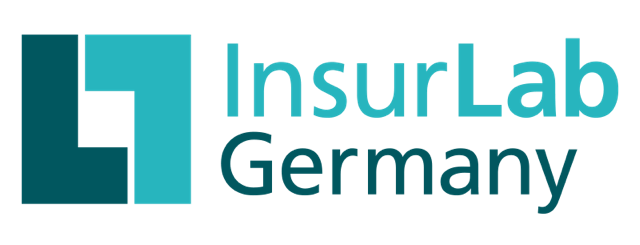This interview was published on 29.08.2018 in the Originial on the SAS Blog published. Many thanks to Andreas Becks for the interview.
In the Mülheim district of Cologne, not far from Keupstraße with its oriental charm of kebab restaurants, baklava, cafés and mosques, and next to old brick halls, concert halls and TV studios, lies Carlswerk, a large former industrial area that has been transformed by the arrival of new and established companies, restaurants and leisure facilities. It doesn't look like a place where the future of the German insurance industry is being shaped. And yet that is exactly what has happened. InsurLab Germany is based here, a platform that brings together established insurers with technology startups, InsureTechs, technology companies, and research and consulting partners to drive the digital transformation of the German insurance industry. Andreas Becks from SAS recently had the opportunity to talk to InsurLab Managing Director Sebastian Pitzler and Partner Manager Herbert Jansky about how innovation works in the German insurance industry today.
Amazon wants to sell life insurance and insure my home contents and new purchases. Is Alexa my new insurance broker? What does this scenario mean for the German insurance industry?
Sebastian Pitzler: The topic of digitization and innovation is occupying the German insurance industry today more than ever. This is also one of the reasons why we are known as InsurLab Germany. We are now Germany's largest industry initiative for networking startups and insurance companies. It has been clearly recognized that digitalization opens up new opportunities, both vis-à-vis customers and in internal processes, for example through automation. Technologies such as artificial intelligence, blockchain or the Internet of Things promise significant innovation potential as well as new products and services. Insurers must adapt to changing customer needs and behavior. In our everyday lives, we all experience products and services that are so fundamentally different from what we have seen from insurance companies before. So there is something interconnected here: the awareness that you have to be proactive, because digitalization is here. New forms of collaboration with startups and a willingness to work together are also emerging. This gives us considerable impetus to address this issue and really rethink insurance - especially when the pressure comes from outside, such as from Amazon.
Herbert Jansky: You have to look very closely at current developments: Does Amazon want to act as an interface between insurer and customer, e.g., as an aggregator? Or does it really want to be a risk carrier itself at some point? The Internet interface is already there, e.g., via aggregators like Check24 or targeted online placement like with Google AdWords - but the way Amazon will play will be exciting. And probably more are being tried outside Germany at the moment.
What issues are insurance companies dealing with today, especially in the context of digitalization?
Sebastian: We have conducted a survey among our member companies. The main topics are the digitalization of the customer interface, artificial intelligence/predictive analytics/machine learning, blockchain and smart contracts, fraud detection and prevention, but also the Internet of Things with "disciplines" such as smart homes, connected cars and digital health.
These topics and also the disruption scenarios you mentioned are not really new. We have been discussing them for a long time. There is a perception that insurance companies react differently and might even be more cautious when it comes to innovation initiatives. InsurLab Germany is a lively exchange platform. But does it really have strategic significance for its members, or is it more of a recreational event for interested insurance company employees?
Sebastian: We focus very strongly on its strategic importance for the development of the member companies. There are two reasons for this. Firstly, to keep up with the times and see what the trends and technologies are and how they can be implemented in the insurance industry. We see ourselves as mediators and translators. On the other hand, we are a networking platform that faces these challenges together, but also enables organizations to find exciting new partners. Many board members and decision-makers from insurance companies take part in our events. That is why it is very important to us to create very concrete meeting opportunities in the formats we develop, in which we work on real project and innovation ideas. We organize workshops with clearly defined next steps. We are not a "nice event" agency. We want to achieve a tangible impact that changes the insurance industry in the long term and introduces it to the topic of digitalization.
Can you describe a workshop day? What happens and what is the result?
Herbert: In our innovation workshops, we invite startups to discuss a specific topic, such as the digitization of customer communication or predictive analytics and machine learning, for which SAS delivered the keynote. Our goal is to develop as many concrete projects or PoCs as possible between insurance companies and startups. We usually have four to five startups pitch their idea, business model or technology and present it to the insurers. After the pitches, the startups stand in different corners of the room, like in a market, and the insurance representatives choose the most interesting startup that makes for an exciting collaboration. The exact project idea is then worked out in small working groups in the afternoon. To enhance this work, each working group includes business consultants from our member companies who moderate the process. At the end of the day, the working groups present the results to the other participants.
Insurance companies have a long tradition of using analytics. Where does the insurance industry stand in terms of modern analytics and artificial intelligence? That's what our industry experts found out in personal interviews with insurers from all over Europe.
What about the sustainability of the workshops?
Herbert: Let's take our innovation workshop on digitizing customer relationships as an example. We put 10 possible PoCs on paper. The first follow-up project has already been commissioned and is in the final phase - an Alexa skill has been developed for customer communication - and several other projects are in the ramp-up phase.
That sounds good. How do you see the culture of innovation and agility throughout the German insurance industry? Will we soon be able to experience these ideas from our own insurance companies? How do established insurance companies ensure that innovative ideas are implemented sustainably?
Herbert: InsurLab Germany was founded by the insurance industry together with politics and science to focus precisely on digitalization and innovation. The impetus came from the industry, and our framework program was developed together with the members. As a core team, we implement this program and provide our own impetus. But everything we do is in close contact with the member companies.
Sebastian: The topic and the associated pressure to innovate has reached the top decision-makers in the insurance industry. Yes, companies differ in terms of innovation culture and processes. But the absolute will is there to exchange ideas, cooperate and implement innovation projects. Recently, I was invited to be a presenter at the so-called Digisurance conference. The unanimous opinion and broad insight from various discussions and keynotes that day was that real innovation happens when established companies collaborate with startups and implement joint projects. Insurance companies will not do it alone. Openness and collaboration are the way forward.

